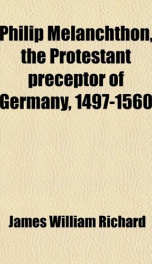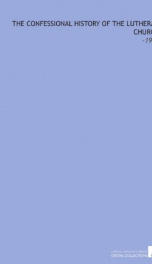philip melanchthon the protestant preceptor of germany 1497 1560

Purchase of this book includes free trial access to www.million-books.com where you can read more than a million books for free. This is an OCR edition with typos. Excerpt from book: CHAPTER III STUDENT AND TEACHER AT TUBINGEN Melanchthon Leaves Heidelberg and Goes to TubingenâLife and Studies at Tubingenâ-Melanchthon Becomes Master of Artsâ Is Licensed to TeachâLectures on the ClassicsâBecomes Proof- Reader, Editor, and TranslatorâObscurantismâMelanchthon Attracts the Attention of Scholars. F)IQUED by the rejection of his application to 1 become a candidate for the Master's degree, and thinking, doubtless, that there was not much more to be learned at Heidelberg, and believing that a change of climate might improve his health, Melanchthon resolved to emigrate to another university. Again following the advice of Reuchlin and Simler, he went to Tubingen, where he matriculated, September 17, 1512, John Schemer being Rector. The University of Tubingen was founded in the year 1477 by Duke Eberhard the Bearded. It also was yet under the domination of the scholastic philosophy; but it had given a larger place than Heidelberg to humanistic culture. Here John Brassican, of Constance, taught Latin Grammar by a simple and practical method. Heinrich Bebel, in 1501 laureated by the Emperor Maximilian, lectured on poetry and eloquence. Melanchthon heard these two with special delight, but he supplemented their deficiencies by reading Virgil and Cicero. He heard Francis Stadian on the philosophy of Aristotle, Simler on Jurisprudence and Logic, and Stoffler on Mathematics and Astronomy. He also heard lectures on Medicine, and read the words of Galen. Greek he pursued privately, assisted by CEcolampadius, who was fifteen years his senior. Hebrew he began at the suggestion of Reuchlin, who had written the first Hebrew Grammar that appeared in Germany. By the aid of this book Melanchthon pursued the study of Hebrew as far as was possible without further assist...
Info about the book
Author:
Series:
Unknown
ISBN:
1145625975
Rating:
3/5 (3)Your rating:
0/5
Languge:
English
Users who have this book
Users who want this book
What readers are saying
What do you think? Write your own comment on this book!
write a commentGenre
if you like philip melanchthon the protestant preceptor of germany 1497 1560 try:
Do you want to read a book that interests you? It’s EASY!
Create an account and send a request for reading to other users on the Webpage of the book!



